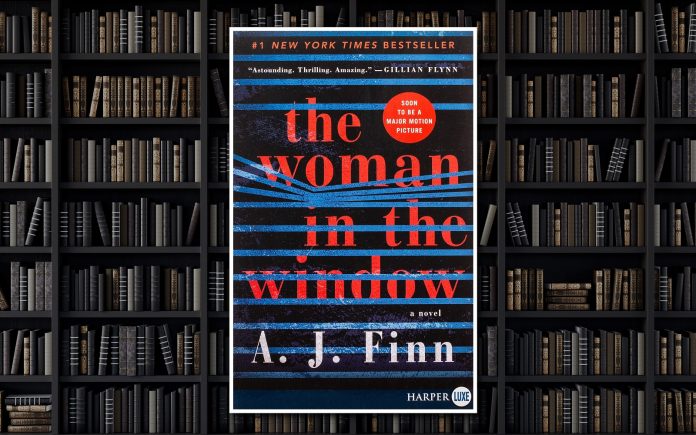
Finn’s 2018 thriller “The Woman in the Window,” a Manhattan shut-in stalks the lives of her neighbors one window at a time.
Roll away Jimmy Stewart’s wheelchair, upgrade his camera, further his timeline; give Hepburn back her eyesight, insert a glass of merlot, restore her from the basement to living areas; invite a neighbor to fire up Ingrid Bergman’s gaslight, but not before they dispose of the charming Charles Boyer; recant all 32 accounts of Gene Tierney’s electroshock therapy: And there she is, Dr. Anna Fox, our contemporary damsel, a mosh-pit of our favorite black-and-white characters, another remake.
“Can you beat a vanished corpse?” Dr. Anna Fox asks herself before popping a palmful of post-traumatic pills into her mouth, probably squeezing or chasing them down her throat with one of her many glugs or slugs or sluices of wine.
“Agoraphobia: in translation the fear of the marketplace, in practice the term for a range of anxiety disorders.”
TWITW’s protagonist, Anna Fox, is our unreliable narrator of choice for A. J. Finn’s (pseudo for Daniel Mallory) debut novel. A thirty-nine-year-old child psychologist, self-prescribed—self-harmed?—to life inside her five-story brownstone in gentrified Manhattan with her family of one: one (phantom) husband, one (ghostly) daughter, one (moody) cat, one glass (bottle) of wine to calm her nerves, one pill (or 3) to keep her sane, one (potentially) murdered neighbor.
“Locked-in syndrome,” she calls it, as though it were a genetic disposition or an inherited disability. Triggered by the same unspoken trauma that separated her from her family, Anna’s recently acquired agoraphobia has been festering like that of an undiagnosable, terminal sickness. Cabin fever meshed with bone-deep paranoia. (We’ve all been there, don’t you think, given the wintry-alone seasons of life we have all spitefully endured as of late?)
Though readers are presented with many inarguable, surface-level details that might suggest otherwise, Dr. Anna Fox is not your run-of-the-mill cat lady. “With a tumbler in one hand and a Nikon in the other,” she stumbles about in her ghost-like home, floor to floor, room to room, marooned and forever-tipsy. Snapping candid photos of her neighbors, inventing conversations between husbands and wives, speaking to herself through a preponderance of besotted quotes, and referring to everyday—sober—occurrences through the lens of a lonely addict. Saying things like: “The words stagger off my tongue like drunks from a bar.”
But—at least she’s self-aware.
While Anna’s imprisoned vocabulary often provides a foreboding—if not stomach-turning—catalyst to this thriller debut novel, A.J. Finn’s unprecedented ability to turn persnickety details into patented character tropes is by far my favorite quality of his writing. Sentences embossed with character, both efficiently pithy yet remarkably dense, walk you through the mind of his protagonist as though the pages turn for themselves. A story on treadmill. Always scraping her limbs across the hardwood floor, always dragging herself into new positions, tripping down to the kitchen. Slow, complacent, laze. And by page 30, you’re either sick to your stomach or pouring yourself a glass of wine, agreeing with her, booze and all, peeking through a slit in your blinds and taking second glances at your neighbors, praying you catch them in the act.
She may spend her days sifting dung from a litter box and critiquing her neighbor’s lifestyles, but she has bottles of beta-blockers to take off such edges. She may be drunk by noon and forever lint-rolling dander from her clothes, but this stay-at-home sleuth is as cinephilic as she is agoraphobic—and alcoholic, and paranoiac—and lives every day as though she were a character starring in her own film. And her splurges of pills are only partially to blame for her blurry—bleary?—descriptives; for Anna’s greatest vice is her love for classic noir and film-based cinematography. Films like Gaslight and Rope spinning in the background, quoting lines from Strangers on a Train and Sudden Fear, fantasizing Rear Window scenes, and influencing her new teenage neighbor with a copy of Night Must Fall. “It’s a good one to start with,” Anna promises. “Suspenseful but not scary.”
Voyeur to the routines of her neighbors and the monochrome lives of Hitchcock characters, Anna’s occasional domestic accidents soon appear not as messes to be cleaned, but scenes to shoot, wounds to bandage, bodies to bury, referring once to a dropped glass and a flare of merlot as if the wine itself were pouring out of a victim, flooding the veins of the stonework, black and bloody, crawling toward my feet.
Surveying the streets with her Opteka zoom she claims is better than binoculars, Fox spies into the Russell’s living room window just in time to see a knife plunge into the chest of her newest neighbor, Jane Russell. Dropping her camera to the floor, Anna watches Jane’s hand scrape across the windowsill, her fingers drag lines through the blood. Pages later, once the police have been summoned to her home, Anna relays the scene to Detective Conrad Little who, after questioning Anna’s multiple empty bottles of wine and cartons of pills, believes her accusation to be nothing but a good, old-fashioned cry for help.
Let the mystery begin.
Readers attentive to the common tropes of foreshadowing and sleight of hand villains that mystery authors love to Tetris into their novels will find themselves spiraling with anxiety as if they too have missed a few high-milligram, anti-psychotic doses of their own:
What happened to Anna’s family?
What happened to Jane?
Is Anna crazy?
Is Anna guilty?
Is she right?
Still pacing their homes, still spying on their neighbors, readers will sprint through the final chapters of TWITW as if the words themselves might erase from the page, or disappear before their eyes. Hearts racing long after the last page when the story comes full-circle, tables turned, jaws ajar, the readers finally realizing that Anna’s locked-room mystery was never a riddle meant to be solved, but a question to be answered:
No—You simply cannot beat a vanished corpse.
– Trevor is a writer for EllisDownHome.com. Outside of writing and freelance, or bingeing some new HBO miniseries, Trevor is an avid runner, a disciplined workout partner, and a viciously competitive Spikeball player.






